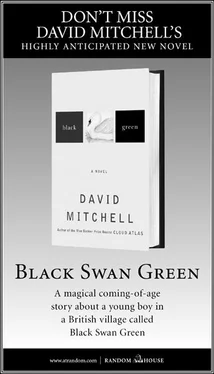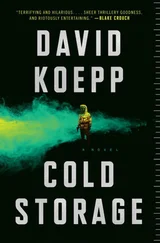David Mitchell - Cloud Atlas
Здесь есть возможность читать онлайн «David Mitchell - Cloud Atlas» весь текст электронной книги совершенно бесплатно (целиком полную версию без сокращений). В некоторых случаях можно слушать аудио, скачать через торрент в формате fb2 и присутствует краткое содержание. Жанр: Старинная литература, на английском языке. Описание произведения, (предисловие) а так же отзывы посетителей доступны на портале библиотеки ЛибКат.
- Название:Cloud Atlas
- Автор:
- Жанр:
- Год:неизвестен
- ISBN:нет данных
- Рейтинг книги:5 / 5. Голосов: 1
-
Избранное:Добавить в избранное
- Отзывы:
-
Ваша оценка:
- 100
- 1
- 2
- 3
- 4
- 5
Cloud Atlas: краткое содержание, описание и аннотация
Предлагаем к чтению аннотацию, описание, краткое содержание или предисловие (зависит от того, что написал сам автор книги «Cloud Atlas»). Если вы не нашли необходимую информацию о книге — напишите в комментариях, мы постараемся отыскать её.
Cloud Atlas — читать онлайн бесплатно полную книгу (весь текст) целиком
Ниже представлен текст книги, разбитый по страницам. Система сохранения места последней прочитанной страницы, позволяет с удобством читать онлайн бесплатно книгу «Cloud Atlas», без необходимости каждый раз заново искать на чём Вы остановились. Поставьте закладку, и сможете в любой момент перейти на страницу, на которой закончили чтение.
Интервал:
Закладка:
Why not? Had no better plan. You groan and shake your head, Sixsmith, I know, but you smile too, which is why I love you. Uneventful journey to the Channel … cancerous suburbs, tedious farmland, soiled Sussex. Dover an utter fright staffed by Bolsheviks, versified cliffs as Romantic as my arse and a similar hue. Changed last shillings into francs at the port and took my cabin aboard the Kentish Queen , a rusty tub that looks old enough to have seen service in Crimea. Spud-faced young steward and I disagreed his burgundy uniform and unconvincing beard were worth a tip. Sneered at my valise and manuscript folder—”Wise of you to travel light, sir”—and left me to muck for myself. Suited me fine.
Dinner was balsawood chicken, powdery potatoes, and a bastard claret. My dining-table companion was Mr. Victor Bryant, cutlery lordling of Sheffield. Not a musical bone in his body. He expounded on the subject of spoons for most of the meal, mistook my civil deportment for interest, and offered me a job in his sales department on the spot! Can you believe it? Thanked him (keeping straight face) and confessed I’d rather swallow cutlery than ever have to sell the stuff. Three mighty blasts on the foghorn, engines changed timbre, felt the ship cast off, went on deck to watch Albion withdraw into drizzly murk. No going back now; consequences of what I’d done struck home. R.V.W. conducted Sea Symphony in the Orchestra of the Mind, “Sail forth, steer for the deep waters only, Reckless, O Soul, exploring, I with thee, and thou with me.” (Don’t much care for this work, but it was perfectly programmed.) North Sea wind had me shivering, spray licked me from toe to crown. Glossy black waters invited me to jump. Ignored ’em. Turned in early, leafed through Noyes’s Contrapuntals , listened to the distant brass of the engine room and sketched a repetitive passage for trombone based on the ship’s rhythms, but was rather rubbish, and then guess who came a-knocking at my door? The spud-faced steward, his shift over. Gave him rather more than a tip. No Adonis, scrawny but inventive for his class. Turfed him out afterwards and sank into the sleep of the dead. One part of me wanted that voyage never to end.
But end it did. Kentish Queen slid into Dover’s snaggletoothed twin sister over the mucky water, Ostend, the Lady of Dubious Virtue. Early, early morning, Europe’s snoring rumbled deep below bass tubas. Saw my first aboriginal Belgians, hauling crates, arguing, and thinking in Flemish, Dutch, whatever. Packed my valise sharpish, afraid the ship might sail back to England with me still aboard; or, rather, afraid of my letting this happen. Grabbed a bite from the first-class galley’s fruit bowl and dashed down the gangplank before anyone with braiding on his uniform caught up with me. Set foot on Continental macadam and asked a Customs man where I might find the railway station. He pointed toward a groaning tram packed with malnourished workmen, rickets, and penury. Preferred shank’s pony, drizzle or no drizzle. Followed tramlines down coffinesque streets. Ostend is all tapioca grays and stained browns. Will admit, I was thinking Belgium was a b. stupid country to run away to. Bought a ticket for Bruges and hauled myself aboard the next train—no platforms, can you believe it?—a decrepit, empty train. Moved compartment because mine smelt unpleasant, but all compartments had same pong. Smoked cigarettes cadged off Victor Bryant to purify the air. The stationmaster’s whistle blew on time, the locomotive strained like a gouty proctor on the pot before heaving itself into motion. Soon steaming through a foggy landscape of unkempt dikes and blasted copses at a fair old clip.
If my plan bears fruit, Sixsmith, you may come to Bruges before v. long. When you do, arrive in that six o’clock in the morning gnosis-ennesque hour. Lose yourself in the city’s rickety streets, blind canals, wrought-iron gates, uninhabited courtyards—may I go on? Why, thank you—leery Gothic carapaces, Ararat roofs, shrubbery-tufted brick spires, medieval overhangs, laundry sagging from windows, cobbled whirlpools that suck your eye in, clockwork princes and chipped princesses striking their hours, sooty doves, and three or four octaves of bells, some sober, some bright. Aroma of fresh bread led me to a bakery where a deformed woman with no nose sold me a dozen crescent-moon pastries. Only wanted one, but thought she had enough problems. A rag-and-bone cart clattered out of the mist and its toothless driver spoke companionably to me, but I could only reply, “Excusez-moi, je ne parle pas flamand,” which made him laugh like the Goblin King. Gave him a pastry. His filthy hand was a scabby claw. In a poor quarter (alleys stank of effluent), children helped their mothers at the pumps, filling broken jugs with brown water. Finally, the excitement all caught up with me, sat on the steps of a dying windmill for a breather, wrapped myself against the damp, fell asleep.
Next thing, a witch was poking me awake with her broomstick, screeching something like “Zie gie doad misschien?” but don’t quote me. Blue sky, warm sun, not a wisp of fog to be seen. Resurrected and blinking, I offered her a pastry. She accepted with distrust, put it in her apron for later, and got back to her sweeping, growling an ancient ditty. Lucky I wasn’t robbed, I suppose. Shared another pastry with five thousand pigeons, to the envy of a beggar, so I had to give him one too. Walked back the way I might have come. In an odd pentagonal window a creamy maiden was arranging Saintpaulia in a cut-glass bowl. Girls fascinate in different ways. Try ’em one day. Tapped on the pane, and asked in French if she’d save my life by falling in love with me. Shook her head but got an amused smile. Asked where I could find a police station. She pointed over a crossroads. One can spot a fellow musician in any context, even amongst policemen. The craziest-eyed, unruliest-haired one, either hungry-skinny or jovial-portly. This French-speaking, cor anglais–playing, local operatic society–belonging inspector had heard of Vyvyan Ayrs and kindly drew me a map to Neerbeke. Paid him two pastries for this intelligence. He asked if I had shipped over my British car—his son was mad keen about Austins. Said I had no car. This worried him. How would I get to Neerbeke? No bus, no trainline, and twenty-five miles was the devil of a walk. Asked if I could borrow a policeman’s bicycle for an indefinite period. Told me that was most irregular. Assured him I was most irregular, and outlined the nature of my mission to Ayrs, Belgium’s most famous adopted son (must be so few that might even be true), in the service of European music. Repeated my request. Implausible truth can serve one better than plausible fiction, and now was such a time. The honest sergeant took me to a compound where lost items await rightful owners for a few months (before finding their way to the black market)—but first, he wanted my opinion on his baritone. He gave me a burst of “Recitar! … Vesti la giubba!” from I Pagliacci . (Pleasant enough voice in lower registers, but his breathing needed work and his vibrato quivered like a backstage thunder board.) Gave a few musical pointers; received the loan of a Victorian Enfield plus cord to secure valise and folder to the saddle and rear mudguard. He wished me bon voyage and fair weather.
Adrian would never have marched along the road I bicycled out of Bruges (too deep in Hun territory) but nonetheless felt an affinity with my brother by virtue of breathing the same air of the same land. The Plain is flat as the Fens but in a bad shape. Along the way I fueled myself with the last pastries and stopped at impoverished cottages for cups of water. Nobody said much, but nobody said no. Thanks to a headwind and a chain that kept slipping off, the afternoon was growing old before I finally reached Ayrs’s home village of Neerbeke. A silent blacksmith showed me how to get to Château Zedelghem by elaborating my map with a pencil stub. A lane with harebells and toadflax growing in the middle led me past a deserted lodge house to a once stately avenue of mature Italian poplars. Zedelghem is grander than our rectory, some crumbly turrets adorn its west wing, but it couldn’t hold a candle to Audley End or Capon-Tench’s country seat. Spied a girl riding a horse over a low hill crowned by a shipwrecked beech tree. Passed a gardener spreading soot against the slugs in a vegetable garden. In the forecourt, a muscle-bound valet was decoking a Cowley Flat Nose. Seeing my approach, he rose and waited for me. In a terraced corner of this frieze, a man in a wheelchair sat under foamy wisteria listening to the wireless. Vyvyan Ayrs, I presumed. The easy part of my daydream was over.
Читать дальшеИнтервал:
Закладка:
Похожие книги на «Cloud Atlas»
Представляем Вашему вниманию похожие книги на «Cloud Atlas» списком для выбора. Мы отобрали схожую по названию и смыслу литературу в надежде предоставить читателям больше вариантов отыскать новые, интересные, ещё непрочитанные произведения.
Обсуждение, отзывы о книге «Cloud Atlas» и просто собственные мнения читателей. Оставьте ваши комментарии, напишите, что Вы думаете о произведении, его смысле или главных героях. Укажите что конкретно понравилось, а что нет, и почему Вы так считаете.












